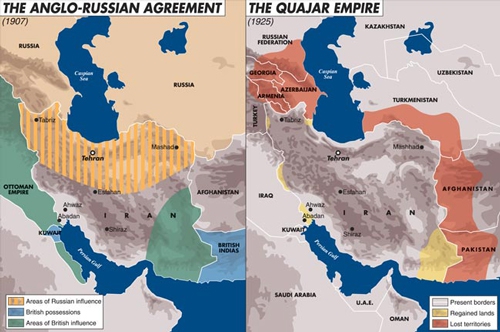Iran became a front for many of the imperial powers and was therefore subjected to British, Russian, Ottoman and German invasions. It is true that this chaotic situation eventually allowed Reza Shah, to centralise his power in a society that the Italian Marxist Antonio Gramsci would term as being in a state of passive revolution; lacking a hegemonic group allowing Ceasarism to flourish. Nevertheless, the lack of any social or political hegemony from any one group
 allowed a heterogeneous nationalist movement to develop, influenced by both ethnic and ideological allegiances to maintain Iran�s sovereignty from foreign invasion.
allowed a heterogeneous nationalist movement to develop, influenced by both ethnic and ideological allegiances to maintain Iran�s sovereignty from foreign invasion.The outbreak of the First World War and its aftermath may be the most important political episode in twentieth-century world history. The fall of the Austro-Hungarian dual monarchy, the Ottoman and Russian empires, followed by the USSR and the Kemalist republic in Turkey were among the most significant outcomes of the conflict.
In Iran the eruption of the war increased foreign pressure, causing the long-standing rift in Iranian politics to widen. The central government was so
 divided and ridden by factions that the different cabinets that were formed never lasted more than a few months. And yet the central government itself was not the sole source of power in the country.
divided and ridden by factions that the different cabinets that were formed never lasted more than a few months. And yet the central government itself was not the sole source of power in the country.Following the approval of the Iranian Constitutional Code by the Qajar king in 1906, Anglo-Russian rivalry in Iran faded away, if only temporarily, and an agreement was concluded between the two great powers. According to the Anglo-Russian agreement of 1907, Iran was divided into three zones-Russian, British and neutral.
In accordance with this agreement, in October 1910, Britain delivered an ultimatum to Iran concerning the security of southern Iran. In so doing, Britain set an example for the Russian to follow. Russian troops had already occupied
 the Northern provinces. In November 1911 the Tsarist government presented its own ultimatum to Iran, which amounted to nothing less than an attempt to reduce the north of the country to the status of a semi-dependent colony.
the Northern provinces. In November 1911 the Tsarist government presented its own ultimatum to Iran, which amounted to nothing less than an attempt to reduce the north of the country to the status of a semi-dependent colony.The initial reaction by the central state of Iran in regards to the start of the war was declaration of Iran's neutrality. When a considerable part of the soil of Iran was occupied by the Antant (allied) forces, then what was the meaning of the neutrality of Iran?
Iran hoped to avoid entanglement in World War I by declaring its neutrality, but ended up as a battleground for Russian, Turkish, and British troops. When German agents tried to arouse the southern tribes against the British, Britain created an armed force, the South Persia Rifles, to protect its interests.
T
 hen a group of Iranian notables led by Nezam os Saltaneh Mafi, hoping to escape Anglo-Russian dominance and sympathetic to the German war effort, left Tehran, first for Qom and then for Kermanshah (renamed Bakhtaran after the fall of Mohammad Reza Shah in 1979), where they established a provisional government. The provisional government lasted for the duration of the war but failed to capture much support.
hen a group of Iranian notables led by Nezam os Saltaneh Mafi, hoping to escape Anglo-Russian dominance and sympathetic to the German war effort, left Tehran, first for Qom and then for Kermanshah (renamed Bakhtaran after the fall of Mohammad Reza Shah in 1979), where they established a provisional government. The provisional government lasted for the duration of the war but failed to capture much support.Although Iran proclaimed neutrality in the war, several battles were fought in western Iran between Russian and Ottoman forces. These battles destroyed many villages, killed several hundred Iranian civilians, and caused near-famine conditions that probably caused the death of several thousand more. The inability of the Iranian government to protect the country provoked rebellions and autonomy movements in northern Iran between 1915 and 1921.
At the end of the war, because of Russia's preoccupation with its own revolution, Britain was the dominant influence in Tehran. The foreign secretary, Lord Curzon, proposed an agreement under which Britain would provide Iran with a
.jpg) loan and with advisers to the army and virtually every government department. The Iranian prime minister, Vosuq od-Dowleh, and two members of his cabinet who had received a large financial inducement from the British, supported the agreement.
loan and with advisers to the army and virtually every government department. The Iranian prime minister, Vosuq od-Dowleh, and two members of his cabinet who had received a large financial inducement from the British, supported the agreement.The Anglo-Persian Agreement of 1919 was widely viewed as establishing a British protectorate over Iran. However, it aroused considerable opposition, and the Majlis refused to approve it. The agreement was already dead when, in February 1921, Persian Cossacks Brigade officer Reza Khan, in collaboration with prominent journalist Sayyid Zia ad Din Tabatabai, marched into Tehran and seized power, inaugurating a new phase in Iran's modern history.
By Iran Review











